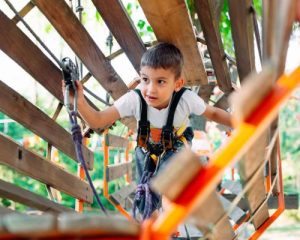A teen mental health expert offers parents advice on avoiding the pitfalls of bad habits.
The early months of the year are usually a time for reflection, resolutions and starting anew. But with the pandemic clearly seeping into 2021, it can be more difficult for teenagers to embrace a fresh start.
That doesn’t mean they can’t try.
Breaking bad habits — whether on Jan. 1 or on some random Tuesday in July — is about making conscious decisions. For parents and teachers, this means helping kids stick to routines. And for teens, this means identifying and reframing their thinking to avoid some of the pitfalls to which they most commonly fall prey.
Pitfall 1: Catastrophizing
As adults we appreciate that time is fleeting. Kids have the opposite perspective, experiencing time distortion that makes any circumstance feel as though it will extend into perpetuity. In 2020, kids’ lives were uprooted academically and socially. The bombardment of “bad news,” from a divided nation to a world dealing with pathogenic and environmental catastrophe, has left some teens feeling hopeless about the future.
It is important for parents, clinicians and teachers to communicate to teens that this is not a “new normal.” We’re not always going to be wearing masks. We’re not always going to be separated into pods. Vaccines are here, and things will get better.
Pitfall 2: Sitting Still and Staying Up
Kids don’t always realize how much they crave routine, but they do. We all do. This is especially true when it comes to exercise and sleep.
The World Health Organization recommends that kids ages 5-17 get an average of 60 minutes per day of aerobic exercise. Exercise has been shown to reduce anxiety and improve mental health. With so many sports still on hold, and kids unable to hang out with their friends, parents and teachers can help kids set up a schedule of activities, like jogging or surfing, that will get them away from their screens and get their heart rates up.
Exercise can also help with another problem that plagues the teen brain: lack of sleep. Cutting out electronics before bed can also help by jump-starting the production of melatonin needed to tell the brain that it’s time to sleep.
Pitfall 3: Isolating
FaceTiming friends and reconnecting can be critical for kids’ mental health. But there is a second type of isolation kids today face that is harder to solve. I have had patients lose grandparents to COVID-19 only to be confronted by social media posts from classmates taken at 200-person, mask-less parties.
The breakdown of our shared understanding of reality is incredibly frustrating and isolating, especially for teens. Here kids will need guidance from parents and teachers to help find the humanity in one another. They follow our lead (even if they don’t admit it). As adults, we can model behaviors and attitudes that will help us rebuild broken societal norms.
Pitfall 4: Poor Diet
I tell patients that we’re like biologic machines that have to be well maintained. You can have the most amazing talents and capabilities, but if you’re not taking care of yourself, you’re not going to reach your potential.
Whether someone is binging junk food or going for too long between meals, a poor diet will catch up with them — physically and mentally. There are plenty of studies about the effects of insulin production on behavior and brain function. Without regular meals and healthy food, our supercomputer brains are simply not going to function properly.
Here, again, parents can help by stocking the house with healthy food options, encouraging family dinners and engaging kids in buying food and preparing meals at home.
Silver Linings
Resources, such as the ASPIRE program at Hoag, are available and have remained open and in-person to provide continued support to the community. Don’t be afraid to reach out for help.
No doubt, this has been a traumatic time for this generation, but I have hope for teens. They have the potential to learn from the experiences of this past year — and to teach the rest of us.
By Sina M. Safahieh, M.D.












Leave a Reply